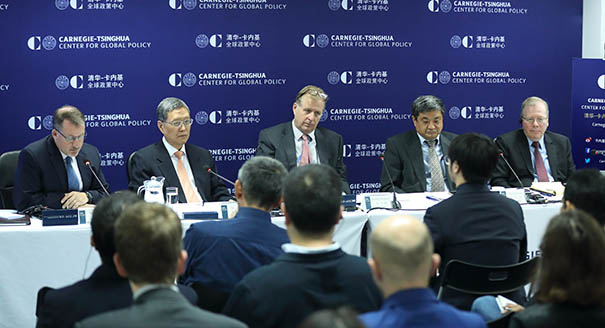Registration
You will receive an email confirming your registration.
In recent years, China has become more active in shaping global governance rules and standards on issues ranging from cyber security to nonproliferation through platforms such as the United Nations, BRICS, and its signature Belt and Road Initiative. President Xi Jinping has sought to promote an image of China as a responsible international stakeholder, as Europe and the United States debate the continued benefits of globalization. However, it remains to be seen how Beijing’s new global governance mechanisms will align with those of the existing global order.
Carnegie–Tsinghua Center director Paul Haenle moderated a discussion with leading Chinese and international experts about the evolution of China’s approach to global governance as the first part of the second annual Carnegie-Tsinghua Global Governance Conference, the second part of which aims to address the intersection of technology and governance and the cultivation of young leaders for international cooperation on the world’s most critical issues.
This event was off the record.
DISCUSSION HIGHLIGHTS
- Global Governance and Geopolitics: Panelists noted that rising anti-globalization sentiments and populist movements, as well as difficulties in U.S.-China bilateral relations, are negatively affecting global governance organizations. Furthermore, Western anxieties about Chinese global governance models, often overlooked by China, are leading to increasingly tense geopolitical entanglements. While there are still many areas for cooperation on technical and economic issues within the U.S.-China relationship, the growing mistrust poses challenges to global governance institutions and systems.
- China's Participation in Global Governance Organizations: Discussants agreed that, as it becomes more active on the international stage, China is largely participating in and acting through existing global governance institutions and not attempting to build its own parallel system. The creation of new organizations such as the AIIB should not be perceived as overtly threatening to existing institutions, as many of China’s international initiatives are consistent with global priorities, such as the UN Sustainable Development Goals. Panelists also argued that competition from China’s new global governance organizations could be beneficial to and drive reform within older governance organizations.
- Unintended Global Implications of China's Domestic Development Plan: China’s development strategy, which has been very successful over the past few decades, has largely focused on improving domestic living standards. Panelists argued that, as China’s domestic policies increasingly affect global economic trends, it will be in China’s own interest to consider the effects of its own growth on the development of other countries. To address the insecurities that China’s growing economic power has generated and for the sake of global stability, the 14th Five-Year Plan should focus on global, not just Chinese, development.
- The Role of U.S.-China Relations in Global Governance: The discussants argued that global governance depends on consensus-building between major powers, thus underlining the significance of increasing tensions in U.S.-China relations. As the compacts that fostered a productive relationship between an emerging and an existing power fall apart, so too could international stability, rules-based global governance systems, and support for international institutions. Accordingly, panelists stressed the need for dialogue in order to eradicate the distrust and suspicions in U.S.-China relations that are stoking geopolitical entanglements.
He Yafei
He Yafei is former vice minister at the Chinese Ministry of Foreign Affairs and counsellor of the Chinese Permanent Mission to the UN in Geneva. He has also served as the deputy director general of the Arms Control Department at the Chinese Ministry of Foreign Affairs.
Yang Bin
Yang Bin is vice president and provost of Tsinghua University and professor of leadership and organization management at Tsinghua's School of Economics and Management. His research interests include business ethics, management, organization, leadership theory and practice, as well as the intersection of business and society.
Paul Haenle
Paul Haenle is the director of the Carnegie–Tsinghua Center for Global Policy based at Tsinghua University in Beijing. Haenle’s research focuses on Chinese foreign policy and U.S.-China relations.
Benedict Bingham
Benedict Bingham is country director for China at the Asian Development Bank.
Nicholas Rosellini
Nicholas Rosellini is UN resident coordinator and UNDP resident representative in the People’s Republic of China.
Zha Daojiong
Zha Daojiong is a professor at Peking University’s School of International Studies. His areas of expertise include development aid, political risk management for Chinese corporations engaged in non-financial investments abroad, and the politics of China’s international economic relations, particularly in the fields of energy and natural resources.
